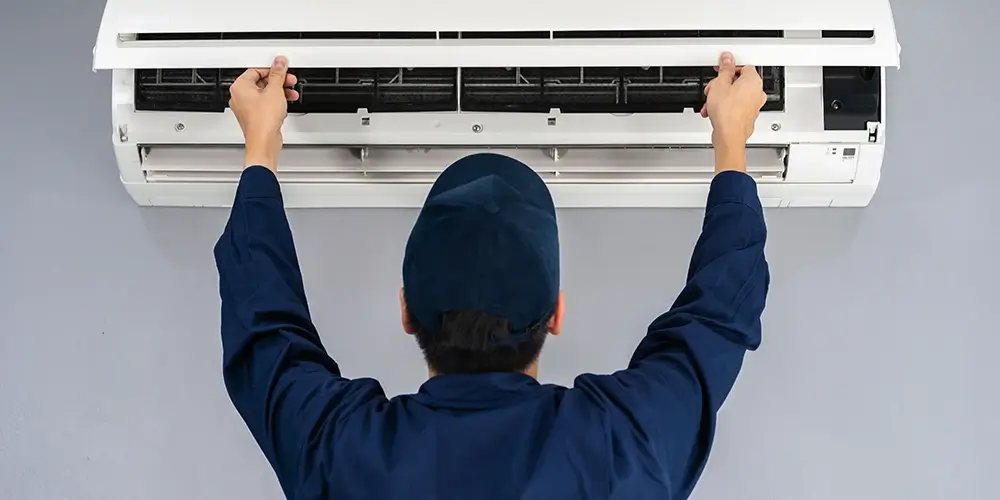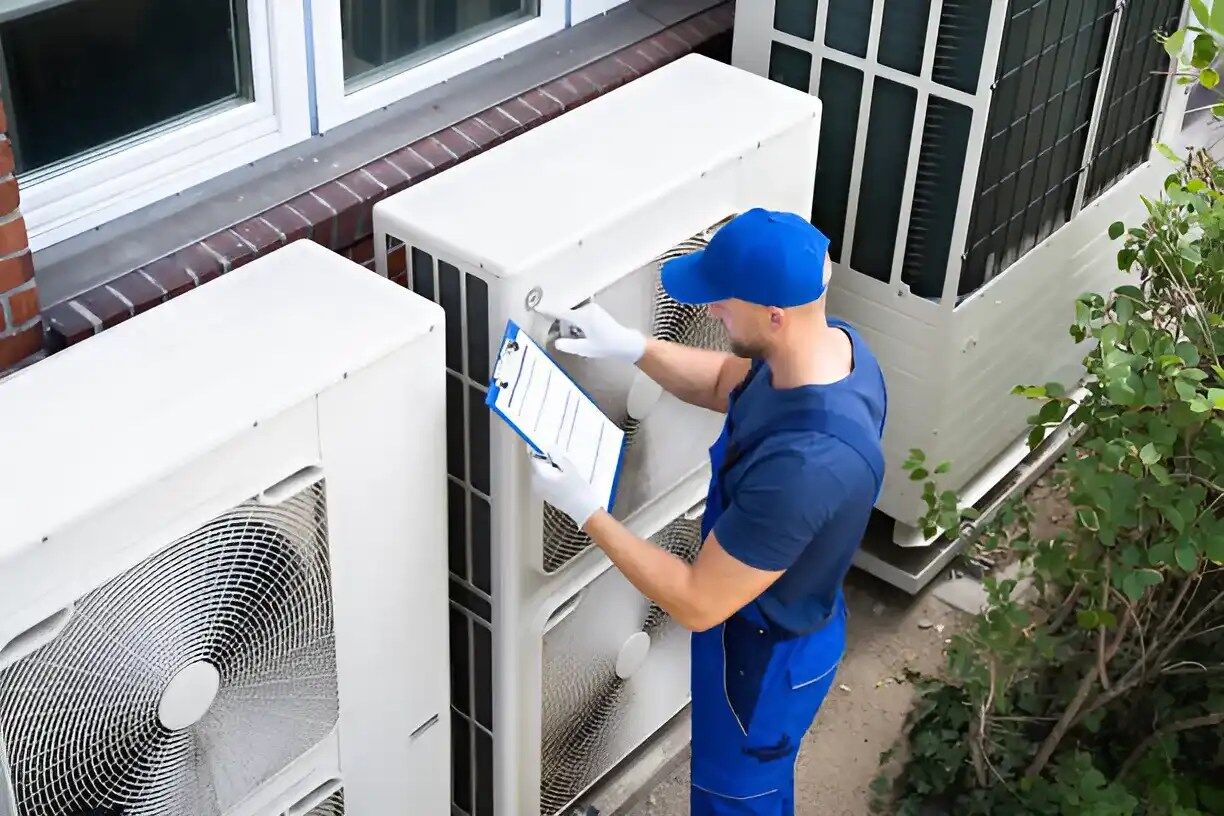Get This Report on Air Conditioning Repair
AC Repair: Professional Cooling System Restoration Ensures Your Home Stays Comfortable All Year Round
Types of A/c Systems
When tackling air conditioning repair work, comprehending the type of cooling system you're dealing with can save time, money, and irritation. Ever wondered why some units cool a room faster than others? Or why certain systems appear to break down more frequently? Let's peel back the layers.
Central Air
Air Conditioning Repair Things To Know Before You Get This
Think of a cool breeze streaming through a whole house, whispering comfort into every corner. Central air conditioning systems do precisely that. They utilize a network of ducts to distribute cooled air, counting on a compressor and condenser outside, coupled with an evaporator coil inside. When this complex beast falters, pinpointing the concern can be like finding a needle in a haystack.
Split Systems

Split systems are a popular option for numerous homes-- part indoor system, part outside compressor. They offer versatility and efficiency, but their dual nature implies repair work can include either part. Have you ever heard an unusual noise outside your house only to find the indoor unit isn't cooling? That's a classic indication of a split system glitch.
The 25-Second Trick For Air Conditioner Repair Near Me
Window Units
These compact warriors battle summertime heat by fitting comfortably into a window frame. They integrate all parts into a single box. Their simplicity typically implies less repair headaches, however ignoring website filters or permitting debris buildup can result in lessened efficiency or breakdowns.
Ductless Mini-Splits
The Single Strategy To Use For Ac Repair Near Me
Ductless systems bypass ductwork totally, making them perfect for homes without existing ventilation. They're quiet, efficient, and surprisingly resilient. Yet, when repairs are needed, professionals must be adept at dealing with refrigerant lines and electrical connections-- no small accomplishment.
Quick Referral Table
| Type | Secret Features | Typical Repair Work Issues |
|---|---|---|
| Central Air | Ductwork, whole-house cooling | Duct leakages, compressor failure |
| Split System | Indoor & & outside systems | Refrigerant leaks, fan motor concerns |
| Window System | All-in-one, simple installation | Filthy filters, electrical faults |
| Ductless Mini-Split | No ducts, zoned cooling | Line leakages, sensor malfunctions |
The Greatest Guide To Ac Repair Near Me
Unraveling the Many Regular A/c Dilemmas
Have you ever questioned why your air conditioning system all of a sudden stops cooling throughout a sweltering afternoon? One common perpetrator is a dirty or clogged air filter. This sly bad guy restricts airflow, forcing your system to work overtime, which not just reduces efficiency but can likewise cause early breakdowns. Imagine attempting to breathe through a scarf taken in dust-- it's tiring!
Another regular misstep is refrigerant leakages. These invisible leakages do not simply reduce cooling power however can likewise harm the compressor, the heart of your air conditioner unit. How typically do you look for unusual hissing noises or ice development on the coils? Capturing these signs early can conserve you from pricey repairs down the line.
Beyond the Fundamentals: Lesser-Known Issues
The Facts About Ac Repair Revealed
Sometimes, the thermostat itself is the nuisance. Miscalibrated or defective thermostats send out combined signals, triggering the a/c to cycle erratically. Ever skilled your air conditioning switching on and off in fast succession? That's called short biking, a tricky efficiency drainer that can wear components quicker than you 'd anticipate.
Electrical issues, such as used electrical wiring or a malfunctioning capacitor, may lurk beneath the surface. AC Repair. These typically manifest as AC units stopping working to begin or unexpectedly closing down. An expert eye understands to evaluate these parts with accuracy tools, something a casual glance will not reveal
Professional Tips for Diagnosing Common Air Conditioning Issues
Ac Fixing for Dummies
- Examine and replace air filters frequently-- every 1 to 3 months depending upon use and environment.
- Listen for unusual noises like rattling or buzzing that might signal loose parts or electrical faults.
- Examine the outdoor unit for debris or obstructions that restrain air flow and cause overheating.
- Search for frost accumulation on evaporator coils, a tip towards refrigerant problems or airflow restrictions.
- Evaluate the thermostat settings and recalibrate if the temperature level readings feel off.
Quick Recommendation Table: Symptoms & & Probable Causes

| Sign | Probable Cause | Professional Tip |
|---|---|---|
| Warm air blowing | Low refrigerant or filthy coils | Tidy coils and look for leakages right away |
| Short cycling | Thermostat issues or large unit | Change thermostat settings and seek advice from sizing guidelines |
| System will not begin | Electrical faults or capacitor failure | Test electrical wiring and replace capacitors as needed |
| Water leakage | Obstructed drain line or frozen evaporator | Clear drain lines and examine for coil icing |
DO IT YOURSELF A/c Maintenance Tips
Our Ac Fixing Statements
Ever discovered your air conditioning unit sputtering like an old engine on a hot summer season day? Ignoring subtle signs often implies more than simply a sweaty afternoon-- it's a prelude to unexpected AC repair expenses. What if you could catch those whispers before they turn into wails? Regular do it yourself maintenance can be your very first line of defense.
Basic Steps to Keep Your Air Conditioning Running Smoothly
Excitement About Air Conditioner Repair Near Me
- Tidy or Replace Filters: A stopped up filter is like attempting to breathe through a scarf. Every 1-3 months, check and swap out your filters. It enhances air flow and efficiency, preventing compressor pressure.
- Check the Condenser Coils: Dust and debris serve as invisible blankets smothering your unit's cooling power. Carefully brush or vacuum the coils, but avoid extreme chemicals that might wear down the metal.
- Examine the Drain Line: When was the last time you glimpsed at your drain pan? A clogged up drain can trigger water leakages and foster mold growth. Flushing it with a vinegar solution monthly keeps the circulation clear.
- Seal and Insulate: Are your ductworks whispering leaks? Sealing gaps with mastic or foil tape increases effectiveness and cuts down on irregular cooling.
Pro Tips Beyond the Essentials
- Measure your unit's voltage to catch subtle electrical wear before it sparks huge issues.
- Listen for uncommon hums or rattles-- these acoustic breadcrumbs often signal loose parts or failing motors.
- Keep outdoor units shaded however ensure a minimum of two feet of clearance around them for optimal air flow.
Ask yourself: Are you hearing your air conditioning's peaceful SOS or just awaiting it to shout? Taking time for DO IT YOURSELF AC maintenance changes reactive repair into proactive care, saving sweat, stress, and yes, cash.
The 4-Minute Rule for Air Conditioning Repair Near Me
Why Proficiency in Air Conditioning Repair Matters
Picture this: your air conditioning unit sputters and groans throughout a scorching afternoon, leaving you sweltering inside your home. Would you trust a novice fumbling with delicate components, or would you seek the peace of mind of a professional AC specialist!.?.!? The complexities of contemporary cooling systems require accuracy and experience. A minor mistake can intensify a minor malfunction into a pricey catastrophe.
Getting My Repair Air Conditioner Near Me To Work
Hidden Complexities Behind the Cool Breeze
Numerous ignore the layers hidden below the streamlined outside of an a/c system - Air Conditioner Repair Near Me. From refrigerant leaks that quietly drain pipes efficiency to defective thermostats that misread temperature levels, these problems need more than a standard toolkit. Specialists have a keen eye for detecting problems that balance homeowners ignore
Vital Tips for Choosing the Right Technician
Ac Repair Near Me Fundamentals Explained
- Accreditation and Training: Validate qualifications; a service technician trained in the newest HVAC innovations is indispensable.
- Experience with Particular Systems: Not all AC units are created equivalent; find somebody familiar with your model's quirks.
- Diagnostic Approach: Competent specialists utilize sophisticated tools-- like electronic leak detectors and thermal imaging-- to determine surprise faults.
What to Get out of a Pro's Diagnostic Process
| Action | Purpose | Professional Insight |
|---|---|---|
| Visual Assessment | Recognize apparent wear or damage | Search for deterioration or unusual sounds-- an obvious sign frequently disregarded |
| Pressure Checking | Detect refrigerant leaks | Subtle pressure drops can mean micro leakages undetectable to the naked eye |
| Electrical Testing | Make sure circuit integrity | Loose connections can simulate serious mechanical failures |
Not known Factual Statements About Ac Fixing
Why Do It Yourself Typically Falls Short
Appealing as it is to tinker with your AC system, do it yourself repairs frequently miss out on the origin. For circumstances, complementing refrigerant may temporarily cool your area but disregards leakages that aggravate with time. Professional specialists don't just spot symptoms; they hunt down the underlying mechanical and electrical faults that sap performance.
9 Easy Facts About Ac Air Conditioner Repair Explained
Concerns to Ask Before Employing
- What diagnostic tools do you use to identify concerns?
- Can you discuss the repair process and expected outcomes?
- Are you familiar with the refrigerants compatible with my system?
- Do you follow security procedures for handling electrical components?